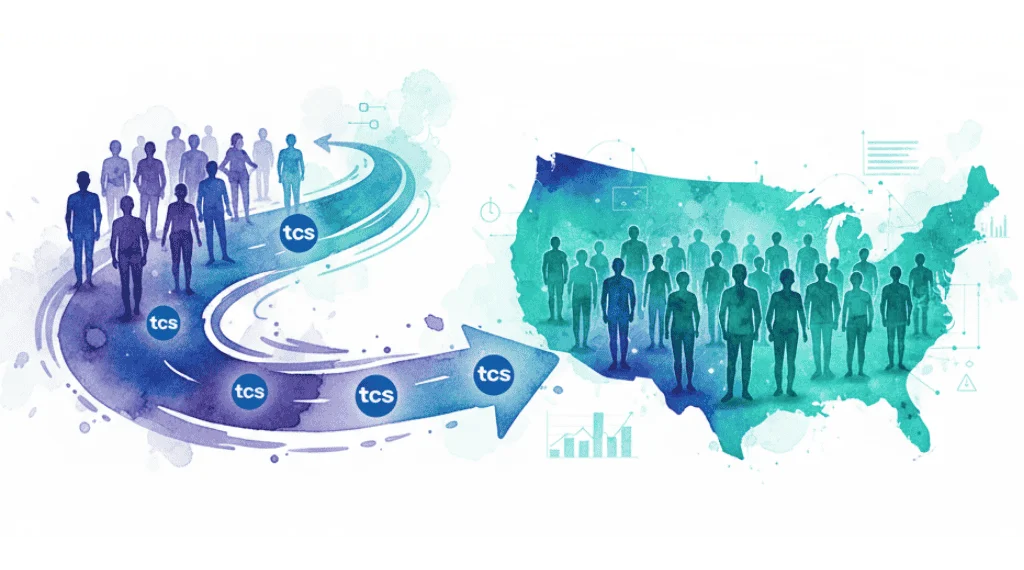Tata Consultancy Services, India’s largest IT services firm, has confirmed a significant strategic pivot in its US hiring approach, moving away from H-1B visa dependency towards building a predominantly local workforce. CEO K Krithivasan announced that the company will not pursue new H-1B hires in the near term, marking a decisive shift in talent deployment strategy.
The move reflects TCS’s response to evolving business requirements, regulatory considerations and client preferences in its largest international market. By January 2025, more than half of TCS’s US workforce comprised locally hired talent, signalling a fundamental transformation in the company’s staffing model.
Reduced visa dependency
Krithivasan confirmed that only approximately 500 employees travelled to the US on H-1B visas during the current financial year, despite the company holding approvals for significantly larger numbers. This represents a deliberate reduction in visa-based staffing as TCS builds its locally rooted talent base.
“We have enough people on H-1 already in the US. I don’t think we would be looking for adding to that count anytime now,” Krithivasan stated in a recent interview with The Times of India. He emphasised that the company’s focus has shifted decisively towards local recruitment to meet client expectations and align with long-term strategic objectives.
Currently, approximately 11,000 of TCS’s 32,000–33,000 US employees work on H-1B visas. The company’s original approach involved rotating visa holders back to India after project completion, a strategy it continues to follow whilst simultaneously expanding local hiring across all geographies, particularly in the US and Europe.
Strategic rationale
Several factors have influenced TCS’s decision to prioritise local recruitment. Client preferences now increasingly favour teams that are locally available and culturally aligned, especially for roles involving direct customer interaction and agile development methodologies. The growing importance of artificial intelligence projects requires closer collaboration with clients and demands diverse skill sets beyond pure engineering or technology capabilities.
The regulatory environment has also played a role, with increased scrutiny around visa programmes prompting companies to reduce dependency on foreign workers. The US government recently announced plans to raise H-1B visa fees to $100,000 starting in fiscal year 2027, up from the current range of $2,000–$5,000. This substantial increase is expected to drive IT firms towards either ramping up offshore operations or accelerating local hiring initiatives.
TCS has invested significantly in training and upskilling local talent, making it more feasible to meet project demands without relying heavily on overseas staff. This approach also helps mitigate risks associated with visa delays and policy changes, ensuring smoother project execution and regulatory compliance.
Industry context and historical perspective
Between 2009 and June 2025, TCS received 98,259 H-1B visas, making it the largest recipient among all companies according to US Citizenship and Immigration Services data. In fiscal year 2025 alone, the company secured 5,505 H-1B approvals, ranking second only to Amazon’s 10,044.
However, the landscape has shifted dramatically in recent years. Whilst TCS remained the only Indian company in the top 10 H-1B visa recipients during the first half of 2025, US technology giants now dominate the programme. Amazon, Microsoft, Meta, Apple, Google, JP Morgan Chase, Walmart and Deloitte have all increased their H-1B usage substantially.
This transformation reflects broader trends in the technology sector. Between 2020 and 2025, Amazon led H-1B visa recipients with 43,375 visas, whilst Google and Microsoft secured 35,736 and 35,356 respectively. Indian firms Infosys and TCS took second and third positions during this period with 43,332 and 38,138 visas respectively.
TCS Regulatory scrutiny
TCS faces ongoing scrutiny from US lawmakers regarding its hiring practices. In September 2025, Senate Judiciary Committee Chairman Charles Grassley and ranking member Richard Durbin sent a letter to Krithivasan raising concerns about the company’s reliance on H-1B visa workers whilst announcing layoffs affecting American staff.
The senators noted that TCS had laid off over 12,000 employees globally, including nearly 60 at its Jacksonville office, whilst continuing to file thousands of H-1B visa petitions. They questioned why the company was hiring foreign technology workers when hundreds of thousands of American technology workers had been laid off in recent years.
Additionally, TCS is under investigation by the Equal Employment Opportunity Commission following allegations from a former employee who claimed the company fired American workers in favour of younger graduates or employees of Indian or South Asian origin on temporary work visas. TCS has denied these allegations, and the case remains ongoing in the District of New Jersey.
Future workforce strategy
Krithivasan explained that TCS already operates with high percentages of local associates in regions including Latin America, the Middle East and Asia-Pacific. The company plans to continue expanding its local workforce across all geographies, recognising that artificial intelligence-driven projects require diverse skill sets encompassing business understanding, domain knowledge and cultural familiarity alongside technical capabilities.
Industry experts suggest this strategic shift may influence other major corporations. With TCS openly stating it will not hire new H-1B holders, companies such as Amazon, Cognizant and Microsoft may follow similar approaches. Organisations with Indian branches might increasingly utilise L-1 visas for intra-company transfers rather than pursuing new H-1B applications.
Despite the reduction in H-1B dependency, TCS maintains ambitious hiring plans for fresh graduates. The company intends to hire 40,000 trainees in 2025, continuing its commitment to talent development through its comprehensive Initial Learning Programme.
For information about career opportunities with TCS in the United States, visit the TCS USA careers portal. Global opportunities are available through the main TCS careers page.






